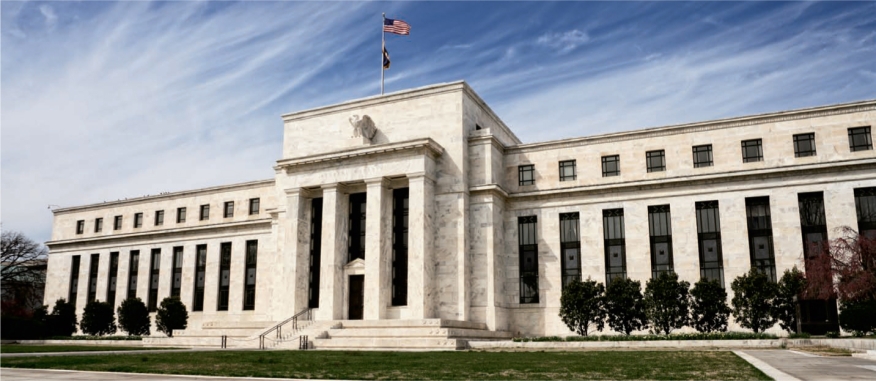
Economists: The Fed’s Rate Hike Could Spark A Recession

There’s even talk of stagflation hitting the U.S. economy
- The Federal Reserve Open Market Committee on Wednesday approved raising the federal funds rate by 75 basis points.
- The FOMC is scheduled to meet again July 26-27, when it could boost the rate another 75 basis points.
To the surprise of many, the Federal Open Market Committee (FOMC) did exactly what wasn’t expected on Wednesday, raising the federal funds rate by 75 basis points, which could stoke a recession, and possibly stagflation, while also giving off ominous effects for the mortgage industry and homebuyers.
The increase in the federal funds rate, which takes the interest rate banks charge when lending to one another overnight to between 1.5% and 1.75%, is the largest the FOMC put through since November 1994, when Alan Greenspan chaired the Federal Reserve and the central bank was attempting to stave off inflation.
As National Mortgage Professional learned, there are a variety of views from economists on what to expect from this latest FOMC decision, which is seen as the Fed’s first shot across the bow to taking down inflation.
Playing Catch-Up
“The Fed knows they got the forecast wrong, and prices are going up across the board, so they’re trying to play catch-up,” said Duke University economics professor Connel Fullenkamp. “The Fed did a pretty good job of hedging its bets publicly in saying, hey, we’re going to monitor the situation, and we’re going to react now to developments.
“The Fed is trying to demonstrate its responsiveness and flexibility,” he continued. “Remember, last year they were all about ‘don’t worry about inflation. This is all transitory.’ So, the Fed’s responsiveness is somewhat of a reaction to its blunders last year. Even though Treasury Secretary Janet Yellen (Jerome Powell’s predecessor as Fed chair) is no longer at the Fed, I think it was quite significant that she made a public statement that she got (inflation) wrong,” he continued.
With the FOMC scheduled to meet again in six weeks, on July 26-27, Fullenkamp says there’s a chance they’ll increase the federal funds rate by another 75 basis points at that meeting, too.
“It’s going to depend on what the headline inflation numbers look like,” he said. “A lot of people are concerned that inflation is going to go above 9%, and, if that happens, we’re almost guaranteed for another 75-basis-point increase.”
The American economy appears to be teetering on that predicament. Last week, the U.S. Bureau of Labor Statistics (BLS) announced that the Consumer Price Index, often considered the inflation rate, increased 8.6%, the largest year-over-year increase in more than 40 years.
“With yesterday’s decision, they’ve (the FOMC) cleared the way for a further 75-basis point increase,” Fullenkamp said. “If they go higher than that, they’re starting to signal they’ve lost control.”
How does this impact mortgage rates?
They’re already moving upward. Mortgage News Daily reports that 30-year fixed mortgage rates topped 6% yesterday, while Bankrate, which also tracks mortgage rates, says that, as of today, the average 30-year fixed mortgage rate is 5.97%.
“Seven percent is definitely on the radar screen,” Fullenkamp said, referencing 30-year fixed mortgage rates. “I don’t know how fast mortgage rates will rise, but 7% is likely by the end of the summer, particularly if we see 75-basis-point increases consecutively.”
He said the FOMC’s actions will take at least a full year to impact the economy.
“You raise interest rates, and you wait for people to put off that big purchase of a house or a new refrigerator or a new car,” he said.
Home Sales Slowing
When it comes to housing, that appears to be happening.
“Mortgage rates are more than 2 percentage points higher than they were just six months ago, and they’re expected to keep climbing,” said Realtor.com Chief Economist Danielle Hale. “Higher mortgage rates are having an effect, causing a slowdown among both existing home sales and new homes sales in recent months.”
The Mortgage Bankers Association, which tracks mortgage applications, said yesterday that while mortgage applications are up compared to a week ago, they remain down year over year due to higher interest rates.
“The cost of financing 80% of the typical home listed for sale has increased by more than 50% in the last year, a surge which dwarfs even the 40-year high in inflation,” said Realtor.com’s Hale. “Data suggests that many shoppers are rethinking their housing budgets, with some of those who can’t relocate to find affordability choosing to rent for now.”
Fannie Mae holds a similar view, saying its Economic and Strategic Research team of economists expect “total home sales to fall 13.5% in 2022 — down even further from its 11.1% projected decline last month.” The group now thinks mortgage originations will move downward to $2.6 trillion this year and drop to $2.2 trillion in 2023.
Freddie Mac Deputy Chief Economist Len Kiefer said the reaction to the rate increase “is a testament that expectations matter, and a lot of the movement we’ve seen is based on market participants' and policymakers' expectations for where they think things are going to head."
Kiefer continued, "In particular, on mortgage rates, a lot of it is based not just on the Fed’s policy but also the expected future path of policy and where inflation is going to go and all that combined together helps us determine the path for mortgage rates.”
He said that November 1994, the last time the FOMC raised the federal funds rate by 75 basis points, "looks closest in terms of the (latest) rate increase, because rates went up very fast. The economy did not go into a recession, which I think is an important point to keep in mind because folks are looking at where we’re might head."
"Home sales definitely slowed," he added. "They fell about 16% year over year following that rate increase, but we got back on a growth path and the housing market recovered pretty quickly." Kiefer said that, in 1995, 30-year fixed mortgage rates jumped two percentage points to above 9% and then dropped to just under 7%.
Even Powell weighed in on the housing market yesterday, saying that while mortgage rates were low during some of the COVID-19 pandemic, “they were coming back up to normal or above levels.”
“The supply of finished homes, the inventory of finished homes that are for sale, is incredibly low,” Powell said. “Historically low. So, it’s still a very tight market. So, prices may keep going up for a while even in a world where rates are up.”
“I would say if you’re a homebuyer, or a young person looking to buy a home, you need a bit of a reset,” he continued. “We need to get back to a place where supply and demand are back together.
“And where inflation is down low again and mortgage rates are low again. So, this will be a process whereby, ideally, we do our work in a way that the housing market settles in a new place and housing availability and credit availability are at appropriate levels,” Powell added.
Recession & Stagflation Fears
Reacting to yesterday’s FOMC decision, Moody Analytics Economist Ryan Sweet said that while the Fed sent a “strong signal that it’s going to tame inflation,” it also made a recession likelier.
“The Federal Reserve applied the brakes harder, making calibrating future monetary policy more difficult and reducing the odds the central bank can engineer a soft landing,” he said.
Fullenkamp agrees, saying a recession is likely either late this year or early next.
“If the Fed plays it right, it will be a fairly mild recession, meaning it lasts for two to three quarters and unemployment increases from 3.6% to 5.5%, which is still low compared to historic standards.”
In 1982, unemployment hit nearly 10 percent, according to the BLS.
The Wells Fargo Institute (WFII) weighed in on the FOMC’s decision, saying it “believes the U.S. economy is signaling a mild recession for the end of 2022 and into early 2023. If inflation and monetary tightening ease in 2023, as the WFII anticipates, a nascent economic recovery that markets may project into 2024 is expected.”
Sweet doesn’t think that 75-basis-point increases are the new normal, unless inflation fails to moderate.
“Odds are that the Fed will hike by 50 basis points at each of the next several meetings,” he said. “The Fed now expects the federal funds rate to end this year at 3.375%, which is above the neutral rate 2.5%,” meaning a federal funds rate that neither stimulates nor hinders the economy.
The series of interest rate increases expected by the FOMC, Sweet says, means the federal funds rate at the end of 2023 will be 3.8%. If this happens, he said, it could push the economy into a mild recession, if not something worse.
“The Fed could be faced with a Hobson’s choice: Push the economy into a mild recession to tame inflation or wait and cause a more significant recession, since a stagflation scenario is possible next year if the Fed isn’t aggressive enough.”
“That’s exactly why the Fed wants to be aggressive now,” Fullenkamp said. “It’s to nip that (stagflation possibility) in the bud.”
Stagflation is typically defined as a period when costs rise substantially, causing a sizable slowdown in the economy and an increase in the unemployment rate.
“The driving force behind stagflation is the ratcheting up of inflation expectations because that’s the mechanism that imbeds the wage-price spiral, where production costs keep going up because wages go up and producers and sellers have to pass on the costs to everybody,” Fullenkamp said. “That’s what the Fed is really desperate to prevent from getting into the economy.”
Could the increased interest rates lead to stagflation in the housing market?
“I don’t think it’s going to stall housing demand overall, but the worry is that it’s just going to make housing even less affordable than it’s become in the past few years,” he said. “You’re going to get more and more of the middle class priced out of the housing market and interest rates are just going to accentuate what the housing industry itself has been doing, which is targeting, if you look at new construction, the top end of the market.
“People aren’t building for the middle market and certainly not the low end, and interest rates are just exacerbating that problem,” he added.
First American, a Santa Ana, Calif.-based financial services firm, noted changes in the housing starts report today.
“Housing starts come in below consensus expectations and fall to a seasonally adjusted annual rate of 1,549,000, which is 14.4% below the revised April estimate and is 3.5% below the May 2021 rate. Single-family starts declined 9.2% month over month to the lowest since August 2020,” said First American Deputy Chief Economist Odeta Kushi. “The decline in housing starts mirrors the decline in homebuilder confidence. Homebuilder confidence dipped lower in May for the sixth month in a row. Homebuilding is a leading economic and housing indicator, and the decline in confidence suggests that housing is cooling.”
Prior to this week, it was thought the FOMC would increase the Federal Funds rate by 50 basis points, not 75 basis points as it did.




